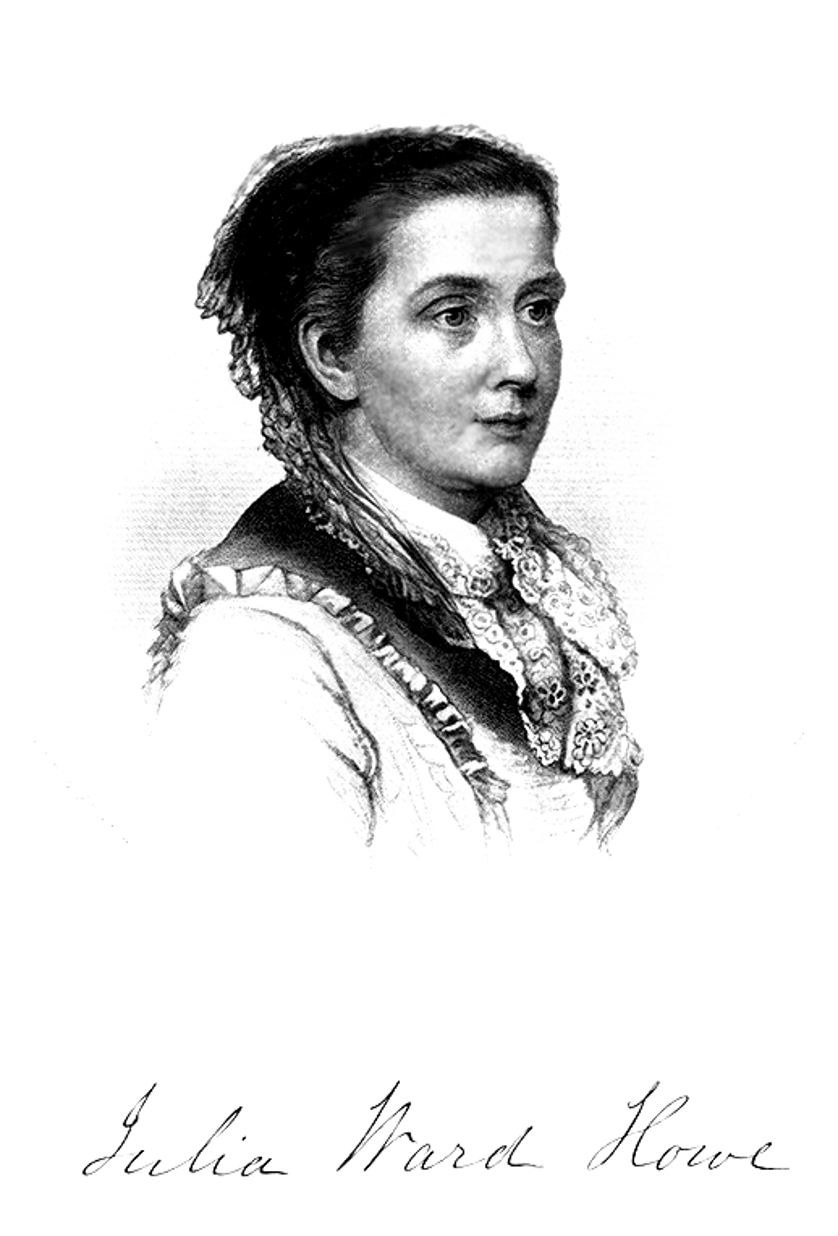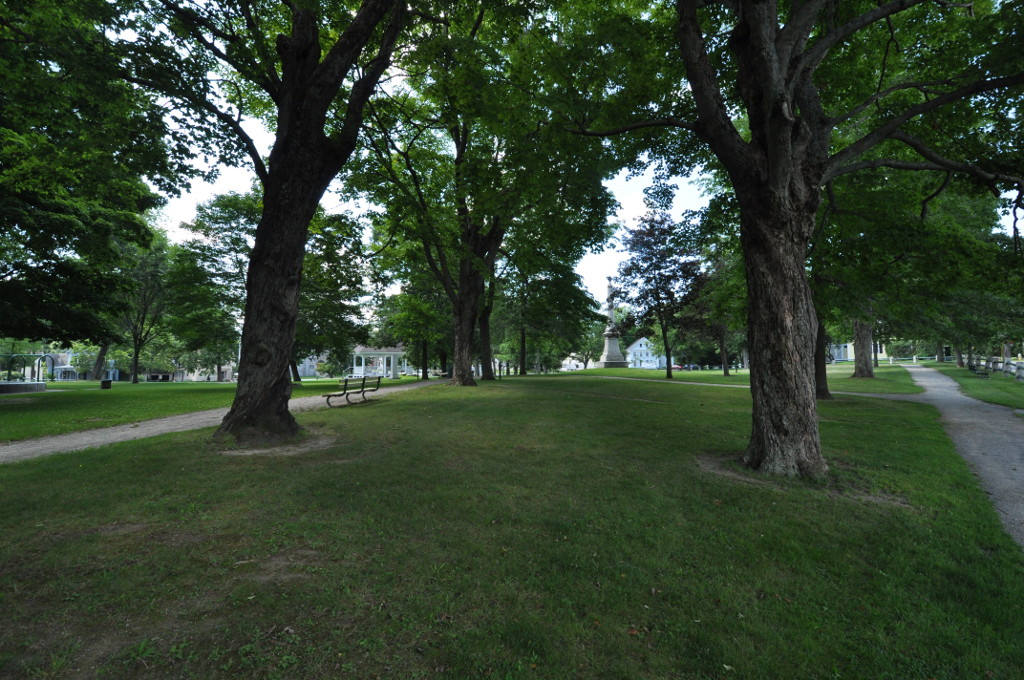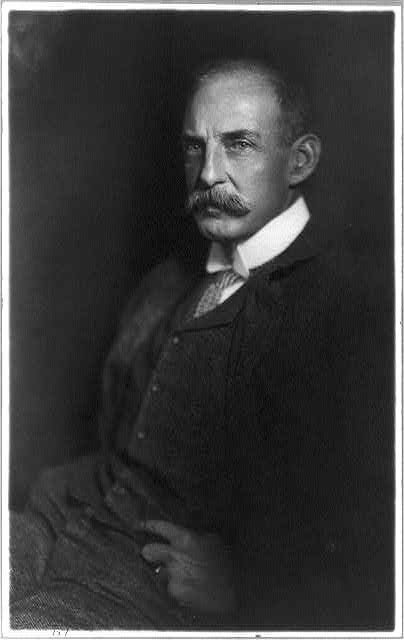|
Julia Ward Howe
Julia Ward Howe (; May 27, 1819 – October 17, 1910) was an American author and poet, known for writing the "Battle Hymn of the Republic" and the original 1870 pacifist Mother's Day Proclamation. She was also an advocate for abolitionism and a social activist, particularly for women's suffrage. Early life and education Julia Ward was born in New York City. She was the fourth of seven children. Her father Samuel Ward III was a Wall Street stockbroker, banker, and strict Calvinist Episcopalian. Her mother was the poet Julia Rush Cutler Ward, related to Francis Marion, the "Swamp Fox" of the American Revolution. She died during childbirth when Howe was five. Howe was educated by private tutors and schools for young ladies until she was sixteen. Her eldest brother, Samuel Cutler Ward, traveled in Europe and brought home a private library. She had access to these books, many contradicting the Calvinistic view. She became well-read, though social as well as scholarly. She met ... [...More Info...] [...Related Items...] OR: [Wikipedia] [Google] [Baidu] |
Samuel Gridley Howe
Samuel Gridley Howe (November 10, 1801 – January 9, 1876) was an American physician, abolitionist, and advocate of education for the blind. He organized and was the first director of the Perkins Institution. In 1824 he had gone to Greece to serve in the revolution as a surgeon; he also commanded troops. He arranged for support for refugees and brought many Greek children back to Boston with him for their education. An abolitionist, in 1863 Howe was one of three men appointed by the Secretary of War to the American Freedmen's Inquiry Commission, to investigate conditions of freedmen in the South since the Emancipation Proclamation and recommend how they could be aided in their transition to freedom. In addition to traveling to the South, Howe traveled to Canada West (now Ontario, Canada), where thousands of former slaves had escaped to freedom and established new lives. He interviewed freedmen as well as government officials in Canada. Early life and education Howe was born ... [...More Info...] [...Related Items...] OR: [Wikipedia] [Google] [Baidu] |
:Template:Infobox Writer/doc
Infobox writer may be used to summarize information about a person who is a writer/author (includes screenwriters). If the writer-specific fields here are not needed, consider using the more general ; other infoboxes there can be found in :People and person infobox templates. This template may also be used as a module (or sub-template) of ; see WikiProject Infoboxes/embed for guidance on such usage. Syntax The infobox may be added by pasting the template as shown below into an article. All fields are optional. Any unused parameter names can be left blank or omitted. Parameters Please remove any parameters from an article's infobox that are unlikely to be used. All parameters are optional. Unless otherwise specified, if a parameter has multiple values, they should be comma-separated using the template: : which produces: : , language= If any of the individual values contain commas already, add to use semi-colons as separators: : which produces: : , ps ... [...More Info...] [...Related Items...] OR: [Wikipedia] [Google] [Baidu] |
Charles Sumner
Charles Sumner (January 6, 1811March 11, 1874) was an American statesman and United States Senator from Massachusetts. As an academic lawyer and a powerful orator, Sumner was the leader of the anti-slavery forces in the state and a leader of the Radical Republicans in the U.S. Senate during the American Civil War. During Reconstruction, he fought to minimize the power of the ex-Confederates and guarantee equal rights to the freedmen. He fell into a dispute with President Ulysses Grant, a fellow Republican, over the control of Santo Domingo, leading to the stripping of his power in the Senate and his subsequent effort to defeat Grant's re-election. Sumner changed his political party several times as anti-slavery coalitions rose and fell in the 1830s and 1840s before coalescing in the 1850s as the Republican Party, the affiliation with which he became best known. He devoted his enormous energies to the destruction of what Republicans called the Slave Power, that is, to the endin ... [...More Info...] [...Related Items...] OR: [Wikipedia] [Google] [Baidu] |
Gardiner, Maine
Gardiner is a city in Kennebec County, Maine, Kennebec County, Maine, United States. The population was 5,961 at the 2020 United States Census, 2020 census. Popular with tourists, Gardiner is noted for its culture and old architecture. Gardiner is a nationally accrediteMain StreetAmerica community. It is included in the Augusta, Maine, Augusta, Maine micropolitan New England City and Town Area. History Located at the head of navigation on the Kennebec River, Gardiner was founded as Gardinerstown Plantation in 1754 by Silvester Gardiner, Dr. Silvester Gardiner, a prominent Boston, Massachusetts, Boston physician. Dr. Gardiner had made a fortune as a drug merchant, with one apothecary shop in Massachusetts and two in Connecticut, and became a principal proprietor of the Kennebec Purchase within the old Plymouth Council for New England, Plymouth Patent. He proved a tireless promoter for his development, which once comprised over . Dr. Gardiner induced a gristmill builder, sawmill, ... [...More Info...] [...Related Items...] OR: [Wikipedia] [Google] [Baidu] |
South Boston
South Boston is a densely populated neighborhood of Boston, Massachusetts, located south and east of the Fort Point Channel and abutting Dorchester Bay. South Boston, colloquially known as Southie, has undergone several demographic transformations since being annexed to the city of Boston in 1804. The neighborhood, once primarily farmland, is popularly known by its twentieth century identity as a working class Irish Catholic community. Throughout the twenty-first century, the neighborhood has become increasingly popular with millennial professionals. South Boston contains Dorchester Heights, where George Washington forced British troops to evacuate during the American Revolutionary War. South Boston has undergone gentrification, and consequently, its real estate market has seen property values join the highest in the city. South Boston has also left its mark on history with Boston busing desegregation. South Boston is also home to the St. Patrick's Day Parade, a celebration of t ... [...More Info...] [...Related Items...] OR: [Wikipedia] [Google] [Baidu] |
Francis Marion Crawford
Francis Marion Crawford (August 2, 1854 – April 9, 1909) was an American writer noted for his many novels, especially those set in Italy, and for his classic weird and fantastical stories. Early life Crawford was born in Bagni di Lucca, in the Grand Duchy of Tuscany, on August 2, 1854. He was the only son of the American sculptor Thomas Crawford and Louisa Cutler Ward. His sister was the writer Mary Crawford Fraser (''aka'' Mrs. Hugh Fraser), and he was the nephew of Julia Ward Howe, the American poet. After his father's death in 1857, his mother remarried to Luther Terry, with whom she had Crawford's half-sister, Margaret Ward Terry, who later became the wife of Winthrop Astor Chanler. He studied successively at St Paul's School, Concord, New Hampshire; Cambridge University; University of Heidelberg; and the University of Rome. In 1879, he went to India, where he studied Sanskrit and edited in Allahabad ''The Indian Herald''. Returning to America in February 1881, he ... [...More Info...] [...Related Items...] OR: [Wikipedia] [Google] [Baidu] |
Maud Howe Elliott
Maud Howe Elliott (November 9, 1854 – March 19, 1948) was an American novelist, most notable for her Pulitzer prize-winning collaboration with her sisters, Laura E. Richards and Florence Hall, on their mother's biography ''The Life of Julia Ward Howe'' (1916). Her other works included ''A Newport Aquarelle'' (1883); ''Phillida'' (1891); ''Mammon'', later published as ''Honor: A Novel'' (1893); ''Roma Beata, Letters from the Eternal City'' (1903); ''The Eleventh Hour in the Life of Julia Ward Howe'' (1911); ''Three Generations'' (1923); ''Lord Byron's Helmet'' (1927); ''John Elliott, The Story of an Artist'' (1930); ''My Cousin, F. Marion Crawford'' (1934); and ''This Was My Newport'' (1944).Maud Howe Elliott , Redwood Library website. 2014-05-21 __NOTOC__ Biography Maud Howe was born on Nov ...[...More Info...] [...Related Items...] OR: [Wikipedia] [Google] [Baidu] |
Laura E
Laura may refer to: People * Laura (given name) * Laura, the British code name for the World War I Belgian spy Marthe Cnockaert Places Australia * Laura, Queensland, a town on the Cape York Peninsula * Laura, South Australia * Laura Bay, a bay on Eyre Peninsula ** Laura Bay, South Australia, a locality **Laura Bay Conservation Park, a protected area * Laura River (Queensland) * Laura River (Western Australia) Canada * Laura, Saskatchewan Italy * Laura (Capaccio), a village of the municipality of Capaccio, Campania * Laura, Crespina Lorenzana, a village in Tuscany Marshall Islands * Laura, Marshall Islands, an island town in the Majuro Atoll of the Marshall Islands Poland * Laura, Silesian Voivodeship, a village in the administrative district of Gmina Toszek, within Gliwice County, Silesian Voivodeship, in southern Poland United States * Laura, Illinois * Laura, Indiana * Laura, Kentucky, a city * Laura, Missouri * Laura, Ohio, a small village Arts, media, and entertainmen ... [...More Info...] [...Related Items...] OR: [Wikipedia] [Google] [Baidu] |
Henry Marion Howe
Henry Marion Howe (Boston, 2 March 1848 – Bedford Hills, New York, 14 May 1922) was an American metallurgist, the son of Samuel Gridley Howe and Julia Ward Howe. Education Howe attended the Boston Latin School, class of 1865, then Harvard College, class of 1869. In 1871, he graduated from the Massachusetts Institute of Technology (M.I.T.) with a degree of "graduate in the department of geology and mining science", later renamed a Bachelor of Science. Career He worked in industry from 1872 to 1882 in the iron and then the copper industries, in the U.S., Chile, Quebec, New Jersey, and Arizona. From 1883 to 1897, he was a consulting metallurgist in Boston, and simultaneously a lecturer at M.I.T. His first book, ''Copper Smelting'', was published in 1885. His second book, ''The Metallurgy of Steel'', was published in 1891. In 1897, he took a chair in metallurgy at Columbia University. In 1903, he published his ''Iron, Steel, and Other Alloys''. He wrote the "Iron and Steel" article ... [...More Info...] [...Related Items...] OR: [Wikipedia] [Google] [Baidu] |
Florence Howe Hall
Florence Marion Howe Hall (August 25, 1845 – April 10, 1922) was an American writer, critic, and lecturer about women's suffrage in the United States. Along with her two sisters, Laura Elizabeth Richards and Maude Howe Elliott, Hall received the first Pulitzer Prize for a biography, ''Julia Ward Howe.'' Early life Howe was born on August 25, 1845 in South Boston, Massachusetts. She was named Florence after Florence Nightingale, her godmother and friend of her parents, and Marion after her great—great-granduncle, General Francis Marion of the Revolutionary War fame. Florence was the second of six children born of the marriage of Dr. Samuel Gridley Howe, a prominent physician, abolitionist and founder of the Perkins Institution and Massachusetts School for the Blind, and Julia Ward Howe, a poet and author, best known for writing "The Battle Hymn of the Republic". Her elder sister was Julia Romana Howe; and her younger siblings included Henry Marion Howe, a metallurgist; La ... [...More Info...] [...Related Items...] OR: [Wikipedia] [Google] [Baidu] |
Julia R
Julia is usually a feminine given name. It is a Latinate feminine form of the name Julio and Julius. (For further details on etymology, see the Wiktionary entry "Julius".) The given name ''Julia'' had been in use throughout Late Antiquity (e.g. Julia of Corsica) but became rare during the Middle Ages, and was revived only with the Italian Renaissance. It became common in the English-speaking world only in the 18th century. Today, it is frequently used throughout the world. Statistics Julia was the 10th most popular name for girls born in the United States in 2007 and the 88th most popular name for women in the 1990 census there. It has been among the top 150 names given to girls in the United States for the past 100 years. It was the 89th most popular name for girls born in England and Wales in 2007; the 94th most popular name for girls born in Scotland in 2007; the 13th most popular name for girls born in Spain in 2006; the 5th most popular name for girls born in Sweden ... [...More Info...] [...Related Items...] OR: [Wikipedia] [Google] [Baidu] |
University Of Massachusetts Press
The University of Massachusetts Press is a university press that is part of the University of Massachusetts Amherst. The press was founded in 1963, publishing scholarly books and non-fiction. The press imprint is overseen by an interdisciplinary faculty committee. Juniper Prizes The press also publishes fiction and poetry through its annual Juniper Prizes.Herman (2007) The Juniper Prize was named in honor of local poet Robert Francis and his house ('Fort Juniper'). The Juniper Prizes include: * 2 prizes for poetry: one for a previously published poet, one for a poet not previously published * 2 prizes for fiction: one for a novel, one for a collection of short stories * creative non-fiction The poetry award began in 1975, the fiction award in 2004, and the award for creative non-fiction in 2018. Notes References * External linksUniversity of Massachusetts Press official website Press Press may refer to: Media * Print media or news media, commonly called "the press" * P ... [...More Info...] [...Related Items...] OR: [Wikipedia] [Google] [Baidu] |






